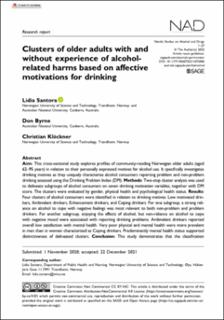| dc.contributor.author | Santora, Lidia | |
| dc.contributor.author | Byrne, Don G. | |
| dc.contributor.author | Kløckner, Christian | |
| dc.date.accessioned | 2022-04-26T11:53:32Z | |
| dc.date.available | 2022-04-26T11:53:32Z | |
| dc.date.created | 2022-02-16T20:20:05Z | |
| dc.date.issued | 2022 | |
| dc.identifier.citation | Nordic Studies on Alcohol and Drugs. 2022, . | en_US |
| dc.identifier.issn | 1455-0725 | |
| dc.identifier.uri | https://hdl.handle.net/11250/2992832 | |
| dc.description.abstract | Aim: This cross-sectional study explores profiles of community-residing Norwegian older adults (aged 62–95 years) in relation to their personally expressed motives for alcohol use. It specifically investigates drinking motives as they uniquely characterise alcohol consumers reporting problem and non-problem drinking assessed using the Drinking Problem Index (DPI). Methods: Two-step cluster analysis was used to delineate subgroups of alcohol consumers on seven drinking motivation variables, together with DPI score. The clusters were evaluated by gender, physical health and psychological health status. Results: Four clusters of alcohol consumers were identified in relation to drinking motives: Low motivated drinkers, Ambivalent drinkers, Enhancement drinkers, and Coping drinkers. For one subgroup, a strong reliance on alcohol to cope with negative feelings was most relevant to both non-problem and problem drinkers. For another subgroup, enjoying the effects of alcohol, but non-reliance on alcohol to cope with negative mood were associated with reporting drinking problems. Ambivalent drinkers reported overall low satisfaction with mental health. Very poor physical and mental health were more prevalent in men than in women characterised as Coping drinkers. Predominantly mental health status supported distinctiveness of delineated clusters. Conclusion: This study demonstrates that the classification approach to profiling of characteristics of alcohol consumers based on their motivations to drink may have a potential utility in human care settings to identify individuals who incur or may be at risk of developing alcohol-related problems in later life, and those who are not. | en_US |
| dc.language.iso | eng | en_US |
| dc.publisher | SAGE | en_US |
| dc.rights | Navngivelse-Ikkekommersiell 4.0 Internasjonal | * |
| dc.rights.uri | http://creativecommons.org/licenses/by-nc/4.0/deed.no | * |
| dc.title | Clusters of older adults with and without experience of alcohol- related harms based on affective motivations for drinking | en_US |
| dc.type | Peer reviewed | en_US |
| dc.type | Journal article | en_US |
| dc.description.version | publishedVersion | en_US |
| dc.source.pagenumber | 27 | en_US |
| dc.source.journal | Nordic Studies on Alcohol and Drugs | en_US |
| dc.identifier.doi | 10.1177/14550725211073006 | |
| dc.identifier.cristin | 2002590 | |
| cristin.ispublished | true | |
| cristin.fulltext | original | |
| cristin.qualitycode | 1 | |

